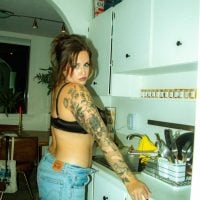
One of my favourite things to do is walk around my apartment and look at all the plants.
This is partly a necessity: spider mites and mealy bugs can wreak havoc, destroy years of work in just a few days.
But mostly, I love seeing them change every day. New leaves are thrilling, but just as satisfying is seeing old leaves yellow and drop. There’s something vital and good in clipping away a thing no longer needed. Day by day, they shift, get bigger in some ways, smaller in others.
The other day I was looking back through old photos of all my plants (as a Taurus, the other half of my camera roll is food), and suddenly it hit me: time had passed. I knew it had, in a way. I could understand it, with the rational part of my mind that works in numbers and facts. But I hadn’t felt that time was passing, not until I saw those photos of plants from years before.
Seeing the difference, I could attribute it to many things: soil and water and sunlight and fertilizer and my careful stalking. But time had been the definitive thing. Nothing else could have caused a change so dramatic.
In my endless pursuit to be and do more, I think I’ve forgotten that no matter how many meditations I do in a day, no matter how many brilliant books I read by my favourite authors, no matter how many blog posts I write, change can only come with that one key input: time.
How often does time, the actual fact of it, match up with how it is felt? When was the last time that a week felt like a week rather than feeling clipped short and frantic, or on the other end, too long to possibly be a week—something more like a week-plus, some serpentine and extended beast? We seem to have a sense of what a week should feel like, regardless, because the standard is rarely met.
I remember learning that time speeds up for us as we get older because of simple math. A year in kindergarten is an entire one-fifth of everything you have ever known. A year at 31…it can feel more like a season, or something even smaller. Does it keep going this way? Does it speed up infinitely until summers are slivers of sun and winters are the cracks of frozen water we step over on the sidewalk?
From what I have heard, it does. But luckily, I have no children to expediate the process.
I don’t think I have ever kept time by weeks or months—those are just square little boxes for me to put my life into. I’ve kept time in a hundred other ways, a realization that highlights the truth that we must all be doing this, keeping time in our own private ways.
How do you know time is passing? Even at this exact moment, it’s moving forward, as we sit in the same places we have sat, talk to the same people, walk down the same streets. Things are changing every second.
Besides plants, there are a few other ways that I know I’ve gotten older.
Like the clothes in my closet. If I thumb through the things on hangers, I will inevitably come across something that I used to love, and wear at least once a week, and realize that it’s been months—could it be years?—since I wore it last. The smell of perfume and deodorant and detergent has worn off, even the clinging scent of smoke and beer and sweat. Suddenly, it seems undeniable that a completely different person loved that piece of clothing, someone I’m not sure I would recognize on the street.
I will still probably not donate the piece in question for another six months.
What about writing? It’s such a solid, numerical way of watching time unspool. I wrote my first blog post here on June 20 of this year, and the person who wrote that is a stranger too. Not completely, because I can go back and see what she was thinking, but she’s already fading away.
The most integral changes are unseen. Like the decision to react differently, or not at all, to something that would have ruined an entire week. The gentle but firm discipline of pulling my eyes away from things that no longer need my attention, no matter how tempting. Faith where there used to be nothing but bewilderment and anger—when will life finally get easier? When that waiting ends, when it’s not about life but more about what you’re doing with it, it seems almost certain that time has passed.
It seems we are not so bad at living in the present moment as we thought. I can look back to every year of my life and remember the certainty that this was It. This was All It Would Ever Be, and nothing could ever change again. Good or bad, the moment seemed infinite. Sleepovers at 12, watching “Poltergeist” behind my fingers. The daze of high school and sleeping at my desk. The structure of university, and the faltering enthusiasm for getting good grades. The parts of my life I was happiest. The parts of my life I thought I would die. The dullness of nothing seeming to change until one day I woke up and everything had.
And what way is there to sum it up?
Plants growing. Snapchat memories. Cupboard ingredients. Pinned iMessages. Contact names. Second-hand furniture. Step counts. Crow’s feet. Tattoos. Ferry ticket stubs. Archived emails. Suntans. Weights at the gym. Tread on shoes. Calluses. Doodles. Collections of things (tarot card decks and shells and candles). Offers sent via email. The keys on a keyring. Odometer readings. Playlists. Bookshelves. Camera rolls.
It was just October and that means a little to me—it puts the planet in the same place that it was when my life changed in permanent and unexpected ways. But if we’re just going in circles, then I think we’re allowed to make it mean whatever we want.
October: the month of yellow leaves and sore hands and ricrac cactus blooms.
~
Please consider Boosting our authors’ articles in their first week to help them win Elephant’s Ecosystem so they can get paid and write more.

 Share on bsky
Share on bsky




Read 4 comments and reply